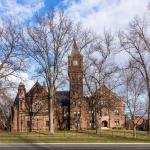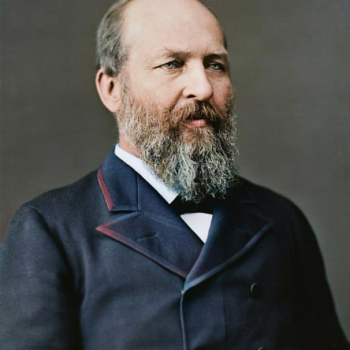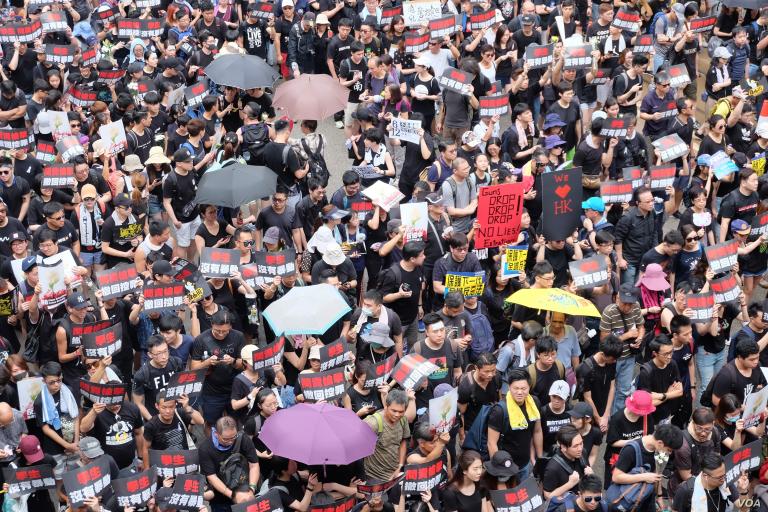
It has been a tumultuous June in Hong Kong, where a proposed bill that would allow China to extradite fugitives has prompted widespread protest. Seeing the measure as a tool for apprehending political dissidents and a threat to Hong Kong’s freedom, opponents of the bill have taken to the streets, with over one million people participating in marches this month. The protests have been peaceful, but tensions have risen, to the point that on June 12, police clad in riot gear fired rubber bullets and tear gas at demonstrators.
As they lift their voices in protest, the people of Hong Kong have also lifted their voices in song. Observers have witnessed demonstrators singing at gatherings throughout the city: on a bridge leading to the Legislative Council building, at a park by the Central Government Office, along the road near the Chief Executive’s Office, and during marches and vigils, as they clutch flowers and crosses, clap hands in rhythm, or raise their hands in prayer. And while it is not surprising for people to sing during political protests, what is surprising is their chosen protest anthem: “Sing Hallelujah to the Lord,” a simple, solemn praise song sung in a round in minor key. How did this song, written by Indiana-born Linda Stassen-Benjamin in 1974, become the anthem of political protestors in Hong Kong in 2019?
To understand the political and cultural significance of this praise song and protest anthem, I turned to Justin Tse, Assistant Professor in Humanities at Singapore Management University and co-editor of Theological Reflections on the Hong Kong Umbrella Movement (Palgrave, 2016). An expert on religion and politics in the Pacific world, Tse emphasized that the current protests in Hong Kong are not a Christian movement, despite the fact that a Christian song has emerged as its anthem. “The thing to avoid is the presumption that somehow Christians, or the church Catholic or Protestant, is somehow behind the protests,” he said. In reality, both Christian and non-Christian people have been marching in the streets, and both Christian and non-Christian people have sung “Sing Hallelujah” during their demonstrations. A closer look at the phenomenon of “Sing Hallelujah” as a protest anthem tells a more complicated story about how people in Hong Kong deploy religious music and imagery for political purposes and, more broadly, how organic political movements defy simple categorization.
On the significance of Christianity in the Hong Kong protests
At first glance, the widespread use of “Sing Hallelujah” as a protest song seems to suggest that Christian people, institutions, and values are driving the popular opposition to the extradition bill. “One of the things I’ve seen quite a bit on my social media is the celebration of how the use of this song ‘Sing Hallelujah to the Lord’ is an indication of how Christian Hong Kong is, or how Christianity has been indigenized or localized (or whatever the missiological term in vogue now is) in Hong Kong, or how Christians are leading the protests,” said Tse.
To be sure, some leading Christian clergy have been vocal opponents of the bill. The Catholic diocese, for example, issued a statement in which it urged the government “not to rush to amend the fugitive bill before fully responding to the concerns of the legal sector and the public.” Several Christian groups—among them, the Hong Kong Christian Council, the Baptist Convention of Hong Kong, and the Christian and Missionary Alliance Church Union Hong Kong—expressed concerns, as well. Cardinal Joseph Zen, the Bishop Emeritus of Hong Kong, was one of the first to speak out against the bill.
Christian people have also been active on the frontlines of the protests. “It is certainly true that in the small hours of the night on June 12 when the General Strike against the extradition bill was enacted (the one that led to all that police violence), Christians came to the site of the protests and sang that chorus in the face of the police, calming tensions for the moment,” Tse said. “Even through the escalation, Christians sang [“Sing Hallelujah to the Lord”] for about eighteen hours on end, and throughout the week, there were groups of Christians who sang.”
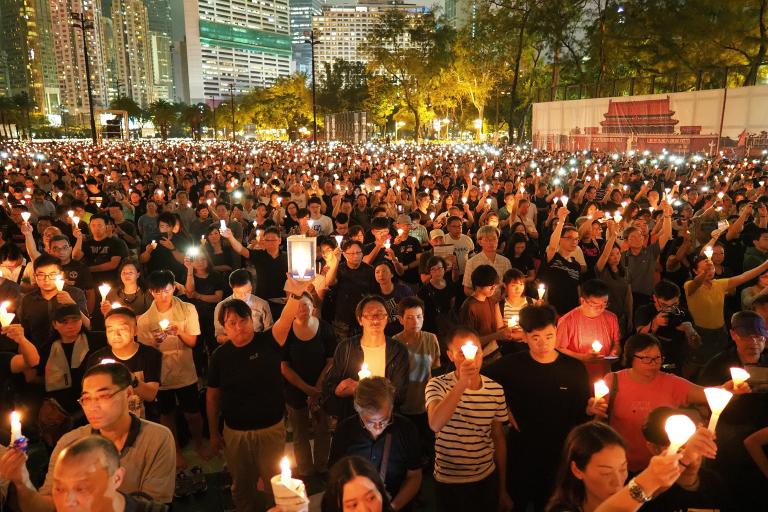
On “talking Jesus” and “Hong Kong humor”
However, in Tse’s view, to take the song’s Christian meaning at face value and to see the protests as driven by Christian activists would be a mistake. For example, he pointed out that the Christian language used by protestors has a double meaning. “I think the most important dimension that hasn’t been considered in the usage of ‘Sing Hallelujah to the Lord’ in the recent Hong Kong protests is the dimension of Hong Kong humor,” he said. “For example, one of the slang terms that is used in Cantonese to describe someone who is longwinded is that they are ‘talking Jesus,’ a reference to how annoying missionaries and their converts are when they are trying to testify to convert someone…In some instances, protesters who may or may not have been Christian have sang the chorus as they isolated violent police officers or pro-police agitators.”
On “the appropriation of Christian images and sounds”
The fact that non-Christians are embracing “Sing Hallelujah” as their protest anthem is also important. Why are non-Christian people engaged in a political (and mostly secular) protest choosing to sing such an explicitly religious song? According to Hillary Leung, a reporter for TIME, “Sing Hallelujah” appeals to protestors precisely because it is religious—and because of how Hong Kong regulates peaceful assembly. “Religious gatherings are exempt from the definition of a ‘gathering’ or ‘assembly’ under Hong Kong’s Public Order Ordinance and are thus more difficult to police,” she explained. Others confirmed that “Sing Hallelujah,” as a religious song, serves as a useful tool for political protesters in search of cover for their gathering. “As religious assemblies were exempt, it could protect the protesters,” said Edwin Chow, acting president of the Hong Kong Federation of Catholic Students. “It also shows that it is a peaceful protest.”
Tse agreed that “Sing Hallelujah” is useful for these reasons, though he emphasized that the popularity of singing this song at protests was unexpected. “The thing to keep in mind is that nobody, to my knowledge, really planned for ‘Sing Hallelujah to the Lord’ to catch on the way it did,” he said. “It was just a song that Christians sang in front of the police that was adopted more broadly.”
More importantly, he stressed that the protests in Hong Kong have had an “organic nature” that makes it difficult, even irresponsible, to make simple claims about representation. “The song doesn’t represent anyone, because the lesson that has been learned from the Umbrella Movement is that no one can represent the protests,” he said. “This became quite clear with the release of Joshua Wong Chi-fung from prison on Saturday; while some Western media continues to see him as the ‘face of the protest’ (as TIME Magazine had him during the Umbrella Movement), he has become quite a controversial figure precisely because he is seen as someone trying to represent a non-representational protest. Wong is also a Christian, as were some of the figures from the Occupy Central with Love and Peace movement in 2013-4 who are now in prison, and so it is again tempting to see these protests as a moment of Christian representation. They are not. If anything, they are about the appropriation of Christian images and sounds in Hong Kong people’s demand to be able to have a say about their own home.”
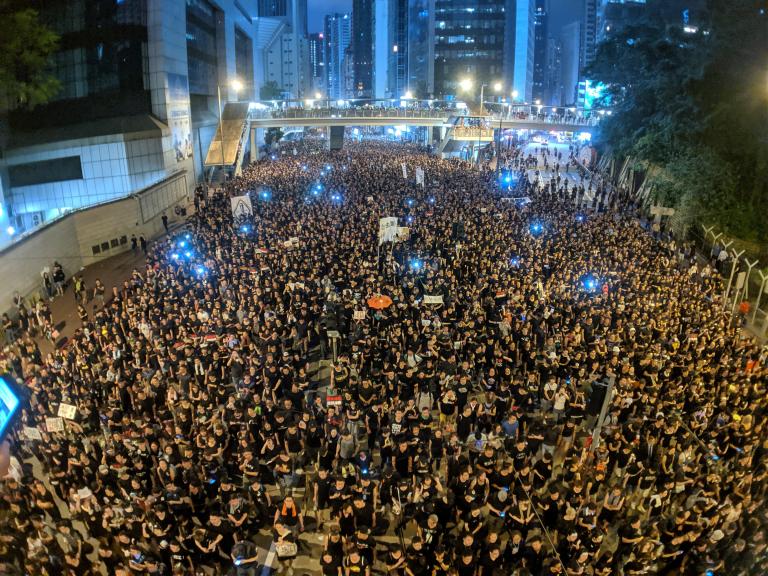
On “theological reflection” and the Hong Kong protests
Ultimately, Tse sees this moment as a critical theological moment for both participants and observers of the Hong Kong protests. To begin, he believes that people need to think more carefully about how they understand religion as functioning in political movements. “The theological reflection from such an organic appropriation of Christianity thus has to move beyond identity,” he said.
Above all, he urged outside observers to resist the temptation to offer simple explanations for the complex political, cultural, social, and religious forces at work in the protests. “What we have to do is to describe how Hong Kong people are doing theological reflection themselves on the post-handover situation in which they find themselves,” he said. This involves humbly paying attention to “what [Hong Kong people] are actually doing and what is organically emerging from these protests that are still in development.” Tse believes that there are valuable theological lessons to be learned from the protestors in Hong Kong. “I’m looking forward to seeing what else they come up with in the future,” he said, “and in this way, my posture is to learn how to do theology from them, with all of the beautifully quirky humor that comes with it.”


